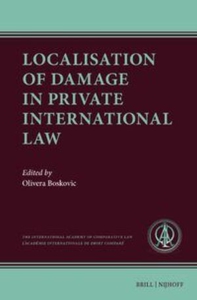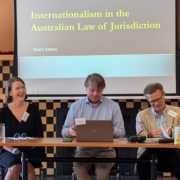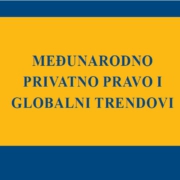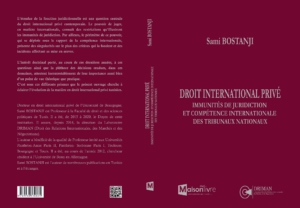Boskovic on Localisation of Damage in Private International Law
 The latest volume (Volume 4) of the Ius Comparatum series, which includes the general reports as well as the national and special reports from the General Congresses and Thematic Congresses of the International Academy of Comparative Law, along with other publications related to the Academy’s activities, has been published. This volume focuses on the Localization of Damage in Private International Law, edited by Prof. Olivera Boskovic (Université Paris Cité).
The latest volume (Volume 4) of the Ius Comparatum series, which includes the general reports as well as the national and special reports from the General Congresses and Thematic Congresses of the International Academy of Comparative Law, along with other publications related to the Academy’s activities, has been published. This volume focuses on the Localization of Damage in Private International Law, edited by Prof. Olivera Boskovic (Université Paris Cité).
The book addresses the complex issue of the localization of damage in private international law, a challenge that has long puzzled legal scholars and practitioners. This comparative work brings together contributions from different jurisdictions to address the many issues raised, as outlined in the book’s blurb below:
Localisation in private international law of torts is a notoriously difficult question. How do you localize financial or moral damage? What about latent damage? Should damage in the context of cyber-torts be localized differently? The great variety of tortious actions gives rise to endless difficulties ranging from banal situations involving material damage to climate change. Trying to find suitable solutions requires answering many difficult questions, such as the very definition of damage within the meaning of private international law rules, the influence of various considerations such as foreseeability, protection of the claimant, and the remedy sought. The contributions in this volume address these questions and more from the perspectives of 17 different countries, from Austria to Venezuela.



 This open access book offers readers a better understanding of the legal situation of children and families migrating to the EU. Shedding light on the legal, practical, and political difficulties at the intersection of international family law and migration law, it demonstrates that enhanced coordination between these policy areas is crucial to improving the legal situation of families on the move. It not only raises awareness of these “interface” issues and the need for stakeholders in migration law and international family law to collaborate closely, but also identifies deficits in the statutory framework and suggests possible remedies in the form of interpretation and regulatory measures.
This open access book offers readers a better understanding of the legal situation of children and families migrating to the EU. Shedding light on the legal, practical, and political difficulties at the intersection of international family law and migration law, it demonstrates that enhanced coordination between these policy areas is crucial to improving the legal situation of families on the move. It not only raises awareness of these “interface” issues and the need for stakeholders in migration law and international family law to collaborate closely, but also identifies deficits in the statutory framework and suggests possible remedies in the form of interpretation and regulatory measures.
 “Droit international privé – Immunités de juridiction et competence internationales des tribunaux tunisiens” (Private International Law – Jurisdictional Immunity and International Jurisdiction of Tunisian Courts) is the title of the long-awaited
“Droit international privé – Immunités de juridiction et competence internationales des tribunaux tunisiens” (Private International Law – Jurisdictional Immunity and International Jurisdiction of Tunisian Courts) is the title of the long-awaited